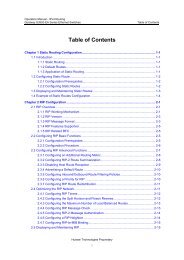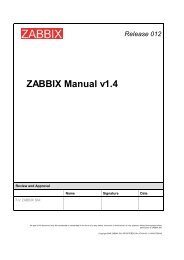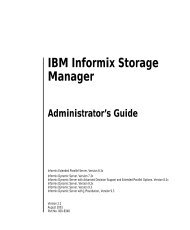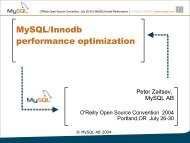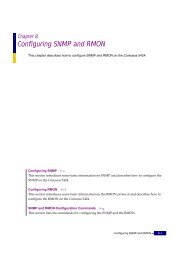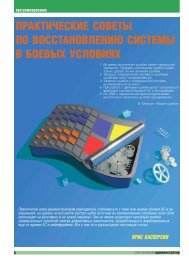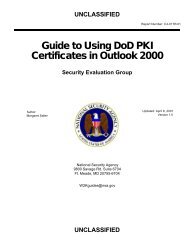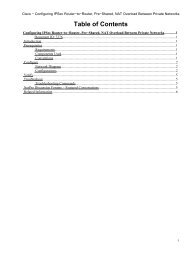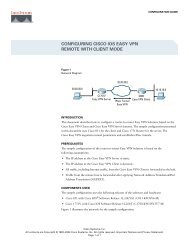Solaris Application Programming, 1/e - Chapter 4 - Parent Directory
Solaris Application Programming, 1/e - Chapter 4 - Parent Directory
Solaris Application Programming, 1/e - Chapter 4 - Parent Directory
You also want an ePaper? Increase the reach of your titles
YUMPU automatically turns print PDFs into web optimized ePapers that Google loves.
4.3 TOOLS THAT REPORT CURRENT SYSTEM STATUS 63<br />
minf: The number of minor page faults per second. These occur when a page<br />
of memory is mapped into a process.<br />
mjf: The number of major page faults per second. These occur when the<br />
requested page of data has to be brought in from disk.<br />
xcal: The number of interprocess cross-calls per second. This occurs when a<br />
process on one CPU requests action from another. An example of this is<br />
where memory is unmapped through a call to munmap. The munmap call will<br />
use a cross call to ensure that other CPUs also remove the mapping to the<br />
target memory range from their TLB.<br />
intr: The number of interrupts per second.<br />
ithr: The number of interrupt threads per second, not counting the clock<br />
interrupt. These are lower-priority interrupts that are handled by threads<br />
that are scheduled onto the processor to handle the interrupt event.<br />
csw: The number of context switches per second, where the process either voluntarily<br />
yields its time on the processor before the end of its allocated slot or<br />
is involuntarily displaced by a higher-priority process.<br />
icsw: The number of involuntary context switches per second, where the process<br />
is removed from the processor either to make way for a higher-priority<br />
thread or because it has fully utilized its time slot.<br />
migr: The number of thread migrations to another processor per second. Usually,<br />
best performance is obtained if the operating system keeps the process<br />
on the same CPU. In some instances, this may not be possible and the process<br />
is migrated to a different CPU.<br />
smtx: The number of times a mutex lock was not acquired on the first try.<br />
srw: The number of times a read/write lock was not acquired on the first try.<br />
syscl: The number of system calls per second.<br />
usr: The percentage of time spent in user code.<br />
sys: The percentage of time spent in system code.<br />
wt: The percentage of time spent waiting on I/O. From <strong>Solaris</strong> 10 onward, this<br />
will report zero because the method of calculating wait time has changed.<br />
idl: The percentage of time spent idle.<br />
In the code in Example 4.18, the two processors are spending about 50% of their<br />
time in user code and 50% of their time idle. In fact, just a single process is running.<br />
What is interesting is that this process is migrating between the two processors<br />
(you can see this in the migrations per second). It is also apparent that<br />
processor 0 is handling most of the interrupts.




